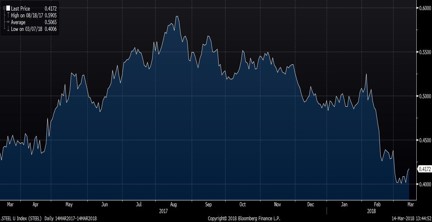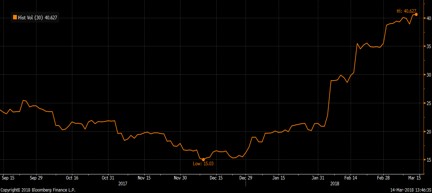Investment Strategies
How Can Investors Guard Wealth Amid Rising Protectionism?

What should investors do when thinking of the rise of some trade barriers, as appears to be on the cards in countries such as the US? A UK-based family office considers some ideas.
There is a spectre, a spectre of protectionism rising around
the world. The push by President Donald Trump to slap tariffs on
imported steel and aluminium, which has provoked moves by the EU
to put levies on some US imports, raises fears about a trade war.
Economists famously disagree about many things but it is said
that on international trade, the case against protectionism is
supported by the overwhelming majority of economists – uniting a
Milton Friedman with a Paul Krugman. Whether that consensus still
holds is an open question; we have seen the rise of critiques of
“neo-liberalism” and globalisation (in plain English, free trade
and free market economics) from a number of sources over recent
years. The financial crisis of 2008, even though it was arguably
more about the sins of government than of free markets gone amok,
has led many to think that the case for unfettered free trade
that seemed to reign supreme after the end of the Cold War, was
waning.
With all that in mind, the idea that protectionism could be on
the rise may cause high net worth individuals and their advisors
to re-think their investments and shape of their portfolios. How
should the issue of trade affect one’s thinking? To consider such
questions, Christian Armbruester, CEO and founding principal of
UK-based Blu
Family Office, offers some thoughts. The editors of this news
service are pleased to share these ideas with readers and invite
responses. They can email tom.burroughes@wealthbriefing.com
The views of guest contributors are not necessarily shared by this publication’s editors.
With all the talk about tariffs and a looming global trade war,
what can we do as investors to protect ourselves and are there
any investment ideas to take advantage of potential
opportunities?
There is always a trade and one can always take out insurance.
So, to explore our options, let us first examine the effect of
any such tariffs. As we all know from attending our very first
economics class, trade wars are bad. For one, they restrict trade
and two, they divert resources to inefficient industries
(otherwise why protect them). Indirectly, protectionist action in
one area usually affects trade in other industries and, for the
most part, there really are no winners. Which is why we rarely
have trade wars, but Trump politics is the topic for another
article.
So, how can you protect yourself from reduced trade, fear of
contagion and a general slowdown of global growth? Increase your
credit exposure and reduce equity risk are the obvious choice,
but that will also go hand in hand with lower expected returns.
Something to bear in mind, if the trade wars don’t turn out as
bad as expected.
What about investment ideas to benefit from the proposed actions?
With US steel, aluminium and auto makers under the protection of
the US government, and European companies bearing the brunt of
increased prices, could we buy one set of companies and short the
other? The following chart displays how such a trade would have
looked in anticipation of the tariffs and after the announcement
in regard to the steel sector.
Chart: Steel – Comparing the performance of a group of
European versus US Steel companies

Source: Bloomberg
From the chart we can clearly see that European steel companies
have underperformed their US rivals since the beginning of
February. The problem is of course, when were the tariffs priced
into the shares, e.g. did we already know they were coming and
hence the shares started moving months before the actual
announcement? The second problem is, we don’t know what the
market is now pricing in going forward, e.g. is that it now, and
pending any changes, will the shares just stay where they are as
far as tariffs are concerned?
The other thing we don’t know, is how long these trade
impediments will stay in effect. Already there have been
announcements that some parties will be exempted and, with the EU
announcing that they will charge tariffs on US imports of
Bourbon, Levi Strauss and Harley Davidson, the lunacy of the
whole idea may become clearer and cooler heads could
prevail.
Another investment idea could be to buy some options on the
companies affected in anticipation of increased volatility. With
the almost daily rhetoric of tariff on or off, which industries
and what country may or may not be exempt, it might just make the
shares a bit more active until we see a greater
clarity.
Chart: Volatility of a group of US and European steel
companies

Source: Bloomberg
As the chart makes clear, the volatility has surely increased in
the shares affected by the tariffs. The success of the trade will
clearly depend on getting the entry level right as when to buy
volatility. But the nice thing about buying options is that you
can only ever lose the amount of the premium you buy. As such, at
least we know exactly how much we are risking on the
trade.
Overall, I think the main moves in shares and the industries
affected on this round of tariffs is done, and it will be hard to
make money in any trade unless there is further information or
escalation. It might make sense to speculate which shares or
industries could get hit next with tariffs from either side. “Buy
the rumour, sell the fact” is a well-known trading strategy. But
my favourite strategy is probably to do absolutely nothing and
wait for the fall out and carnage to play itself out. As we know,
there will only be losers from this exercise and waiting to buy
when things are at their most bleak has historically proven to be
the most successful trading strategy. So, go ahead Trump, do your
worst.
